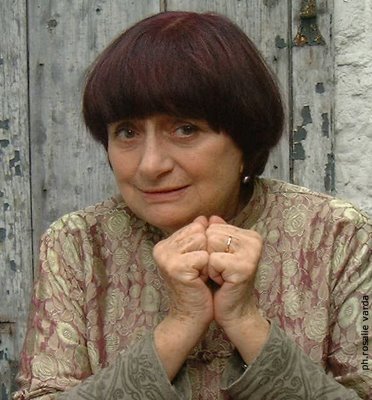| Varda, Agnes
 |
Date of birth
30 May 1928, Brussels, Belgium
Date of death
29 March 2019, Paris, France
Mini biography
Agnès Varda (30 May 1928, Brussels, Belgium )
Agnès Varda (b. 1928 in Ixelles, Belgium) is a Paris-based key figure in modern film history and one of the world's leading filmmakers. Agnès Varda studied at the Ecole du Louvre with a focus on art history.
She then went on to work at the Théâtre National Populaire as a photographer. Her first feature-length film, La Pointe Courte (1954), was an early anticipation of the French New Wave.
Agnès Varda's work is often connected to the French New Wave, and her early films were clear precedents for the stylistic tendencies which the New Wave directors delineated. However, her work remains particular to her own unique perspective on the world, resisting the paradigms of movements in art and film.
“I'm not interested in seeing a film just made by a woman - not unless she is looking for new images.”
The themes and issues in her films focus on eroticism and age, death and time, the collective unconscious, and the presentability of social taboos. Her work is distinct from the French New Wave also for its crossing of genres, as she is known as much for her documentaries and shorts as for her feature-length dramas. Not limiting herself to the borders of France, her films have been shot in a variety of locations, including the United States, Cuba, and Iran.
The documentary form is simultaneously utilized and deconstructed in Agnès Varda's films. While many of her films are considered to be properly documentaries, their fundamental undermining of the objectivity of the documentary form, their blending of seriousness and play, as well as the introduction of subjectivity bring her films into an entirely different category. The subjective factor is something which Agnès Varda does not turn away from or try to cover up, as she readily integrates herself into her films. One example is in the film Uncle Yanco (1967), in which she is having dinner with her Uncle Yanco and she gestures to one of the dinner guests to shut off the camera. This moment, which is kept in the final cut, is a point where documentary and narrative cross and are no longer distinguishable.
One of Agnès Varda's more controversial films is Kung-Fu Master (1987). This work is a fictional film, though the casting of the main characters draws an interesting parallel with reality. In a fearless way, the film tells the story of an adult woman who falls in love with a young boy named Julien. The woman is played by Agnès Varda's friend Jane Birkin, and the boy is played by Agnès Varda's son.
Agnès Varda has directed the following films:
La Pointe-Courte (1955), L'opéra-mouffe (1958), La cocotte d'azur (1958), Du côté de la côte (1958), O saisons, ô châteaux (1958), Les fiancés du pont Mac Donald ou (Méfiez-vous des lunettes noires) (1961), Cléo de 5 à 7 (1962), Salut les cubains (1963), Elsa la rose (1965), Le bonheur (1965), Les créatures (1966), Oncle Yanco (1967), Loin du Vietnam (1967), Black Panthers (1968), Lions Love (1969), Réponse de femmes: Notre corps, notre sexe (1975), Plaisir d'amour en Iran (1976), Daguerréotypes (1976), L'une chante, l'autre pas (1977), Mur murs (1981), Documenteur (1981), Ulysse (1982), Les dites cariatides (1984), Sans toit ni loi (1985), T'as de beaux escaliers tu sais (1986), Kung-fu master! (1988), Jane B. par Agnès V. (1988), Jacquot de Nantes (1991), Les demoiselles ont eu 25 ans (1993), Les cent et une nuits de Simon Cinéma (1995), L'univers de Jacques Demy (1995), Les demoiselles de Rochefort (1967), Les glaneurs et la glaneuse (2000), Le lion volatil (2003), Ydessa, les ours et etc. (2004), Cinévardaphoto (2004), Quelques veuves de Noirmoutier (2006), and Les plages d'Agnès (2008).
Director - Selected filmography
-
Faces Places | Visages, villages (2017)
-
Vagabond | Sans toit ni loi (1985)
-
One Sings, the Other Doesn't | L'une chante, l'autre pas (1977)
-
Plaisir d'amour en Iran (1976)
-
Black Panthers (1968)
-
Cleo from 5 to 7 | Cléo de 5 à 7 (1962)
|

